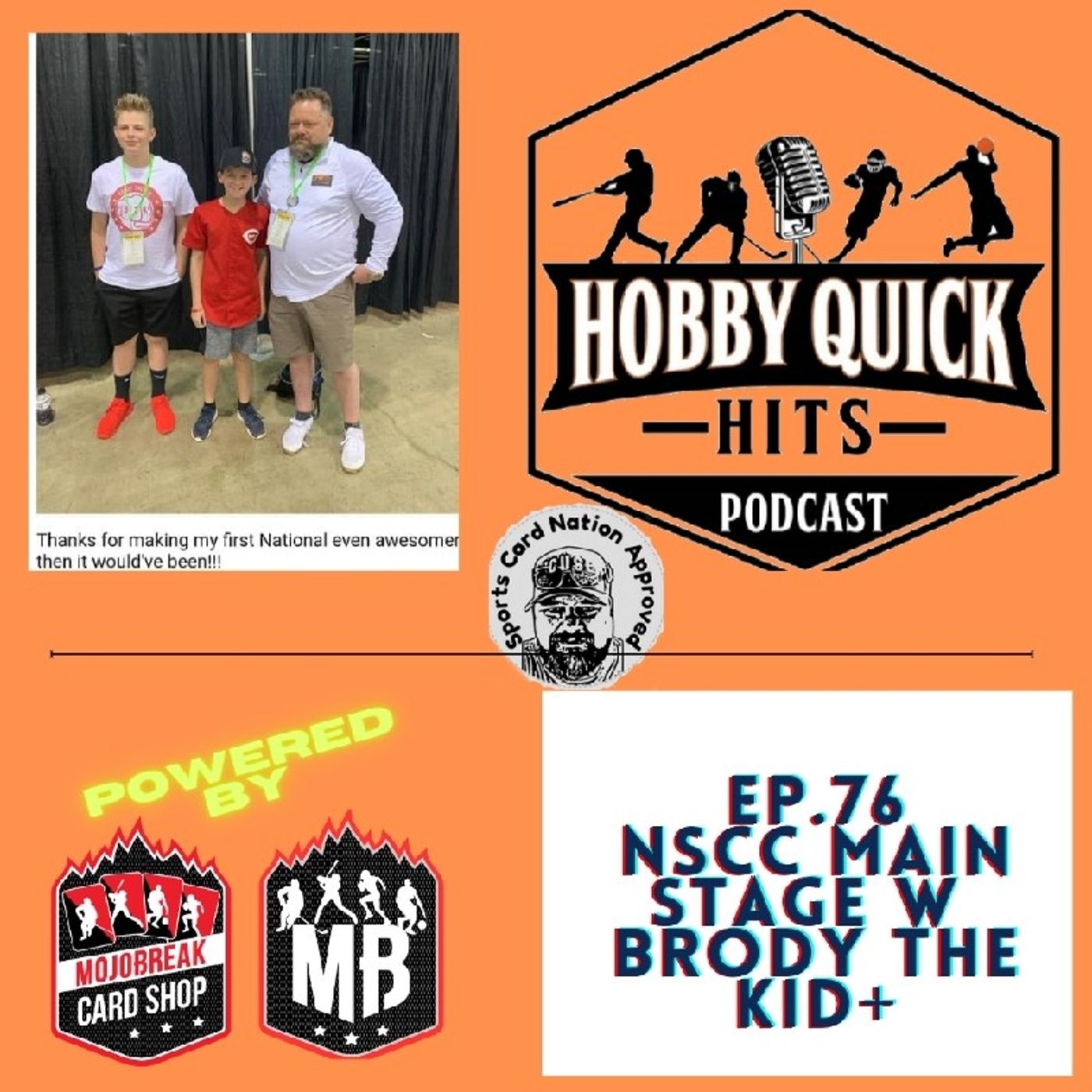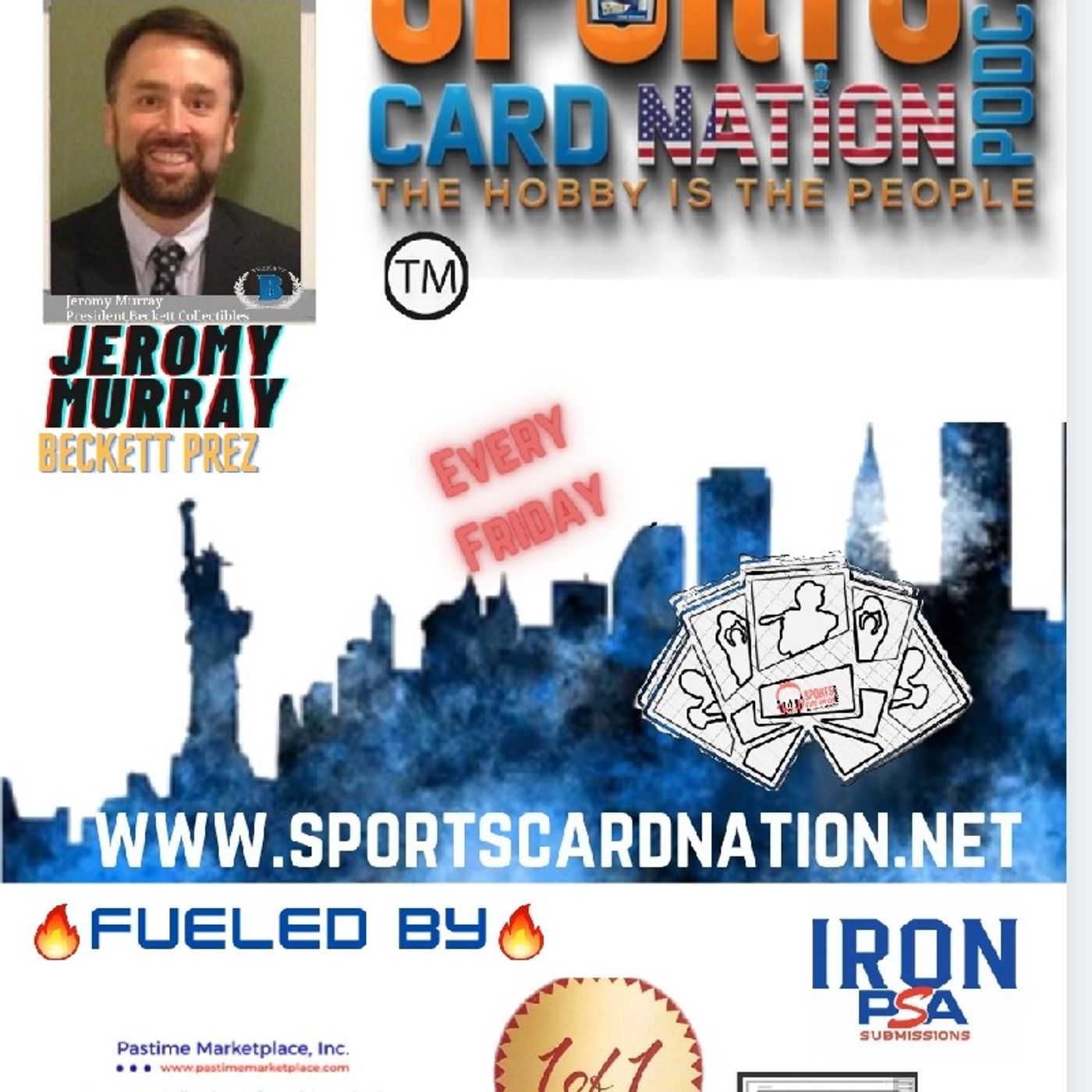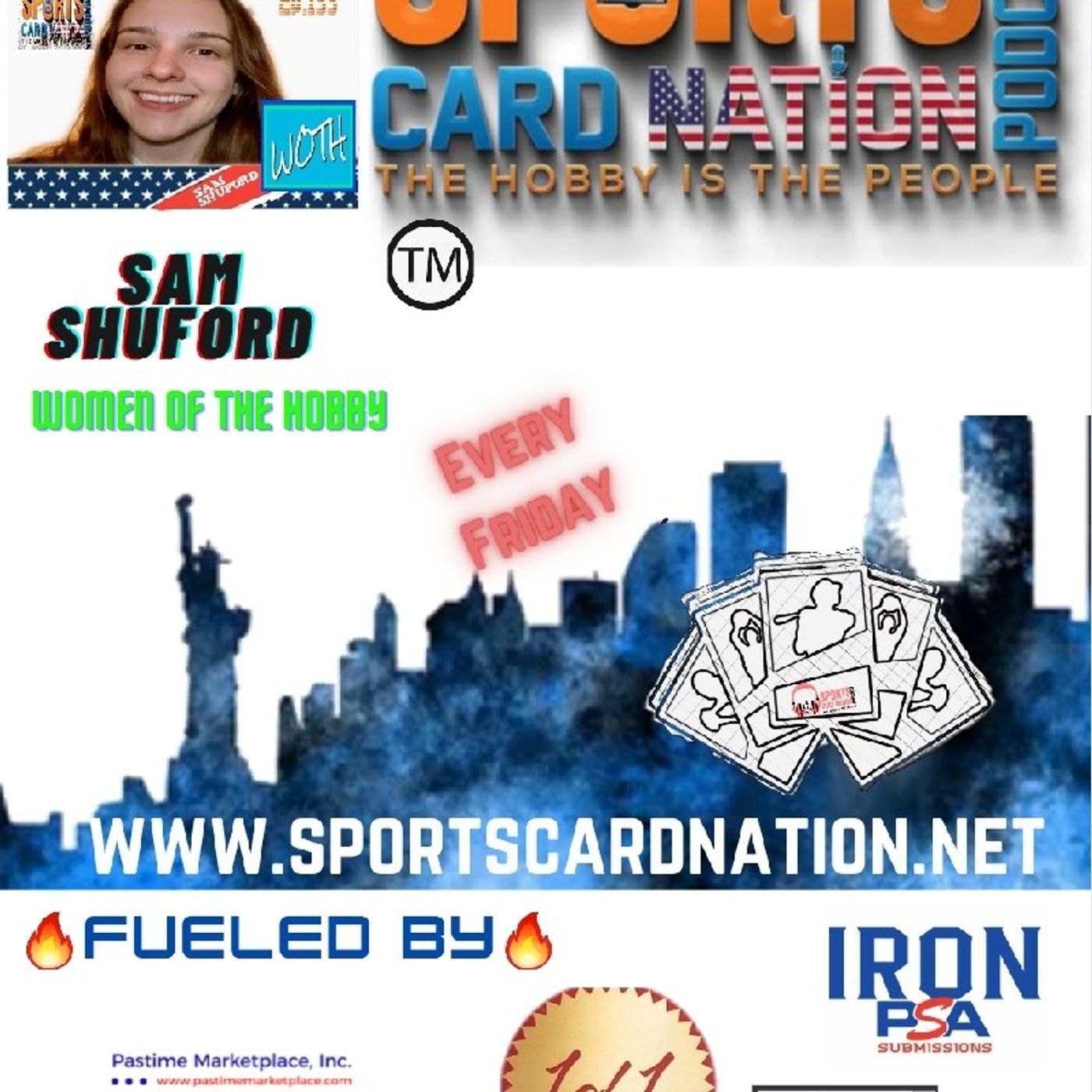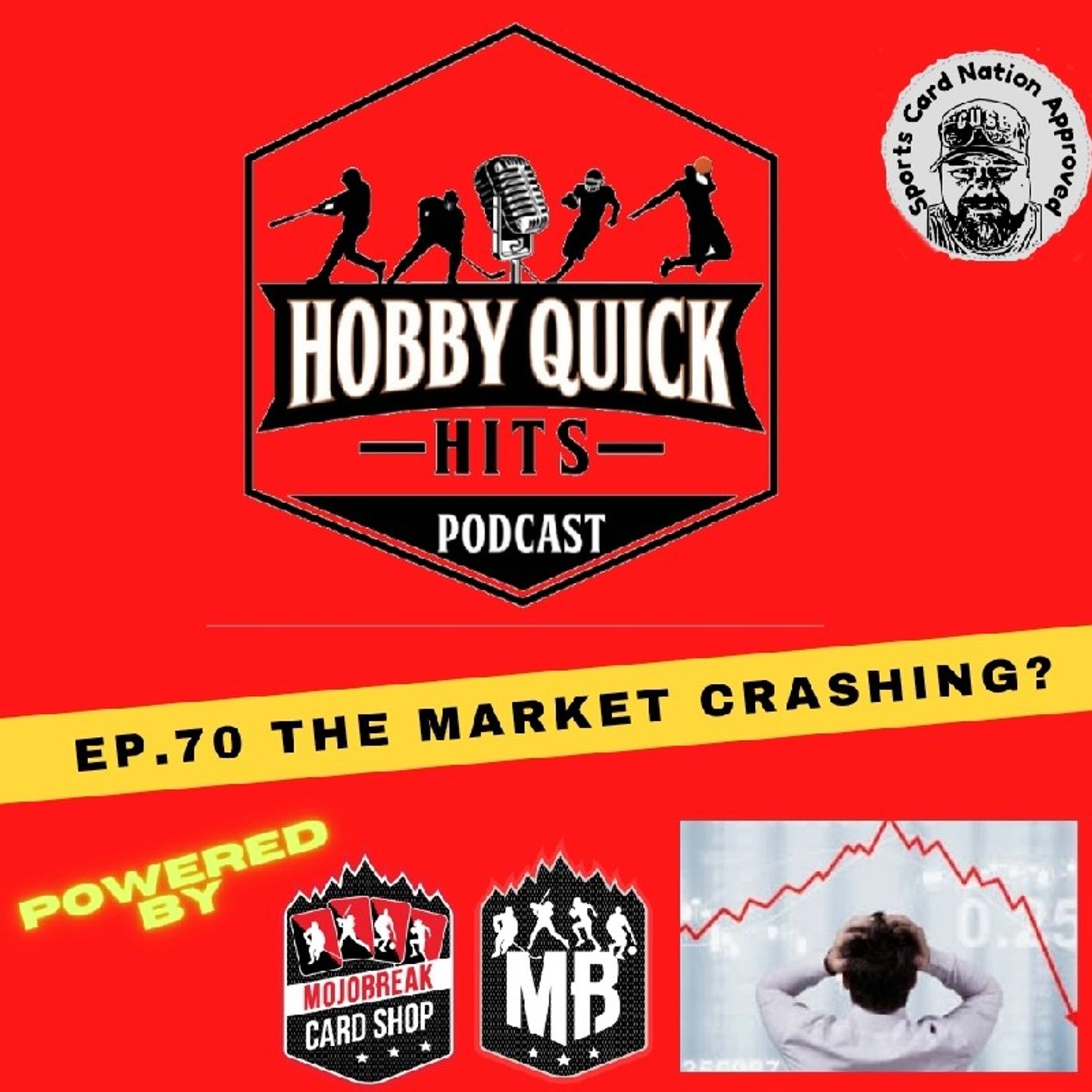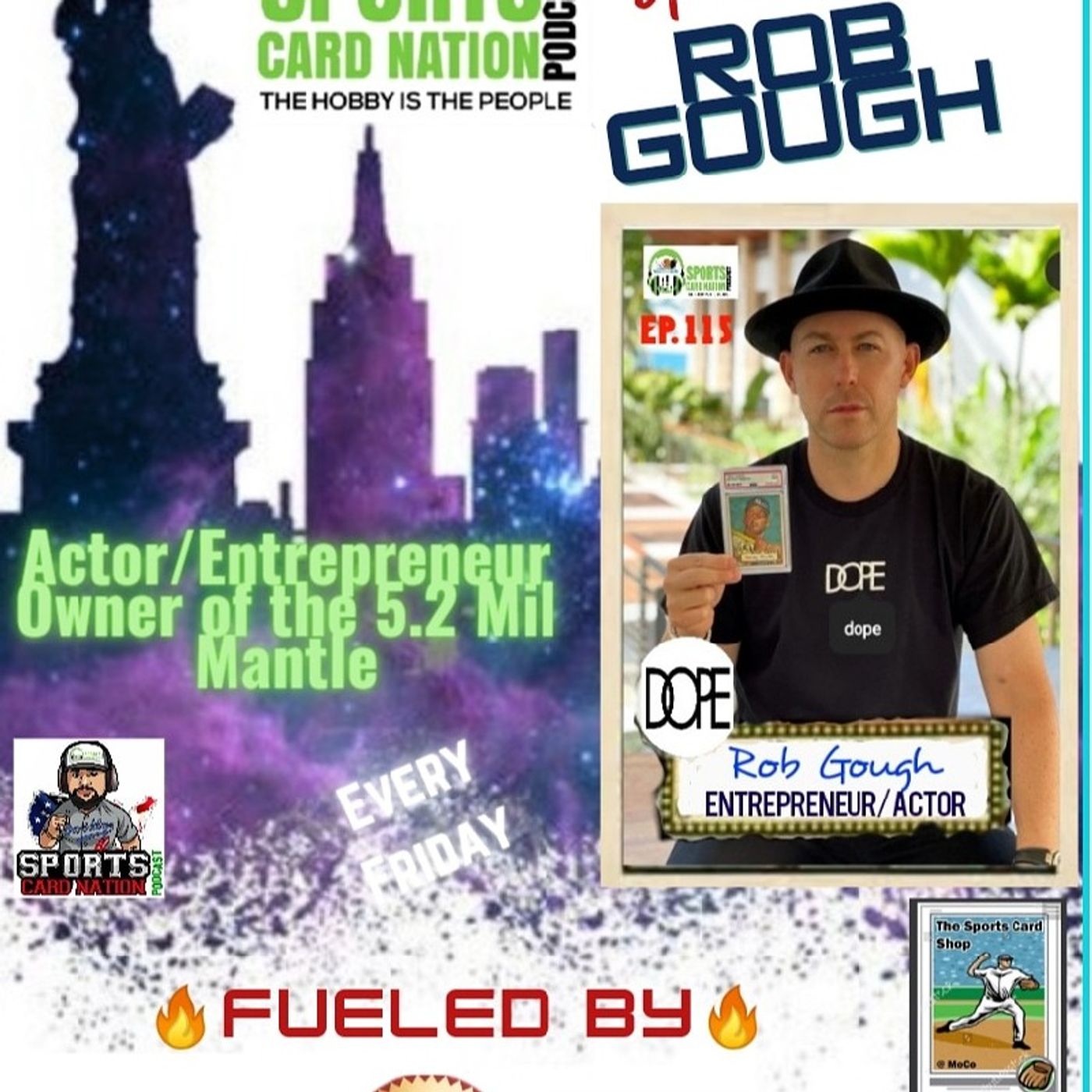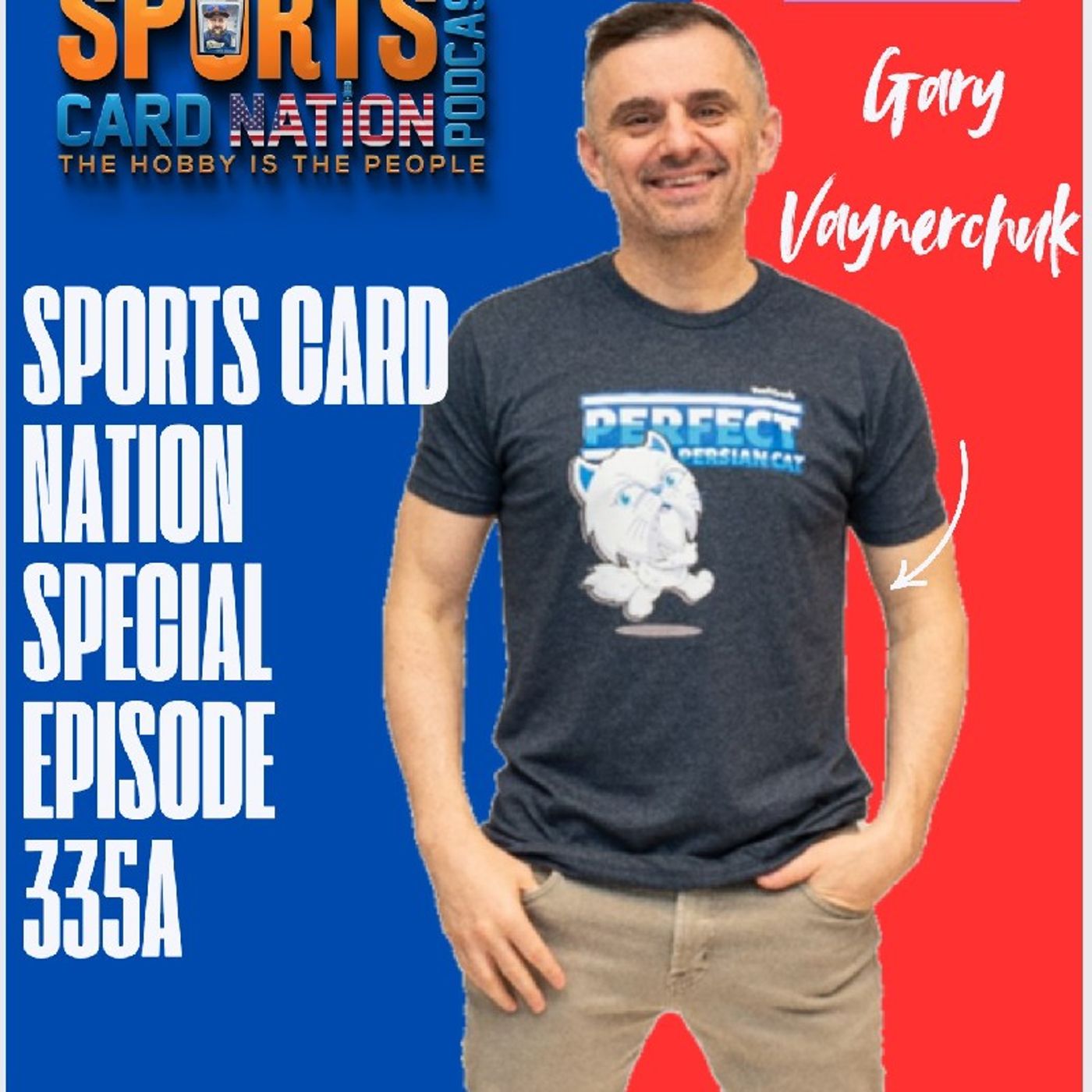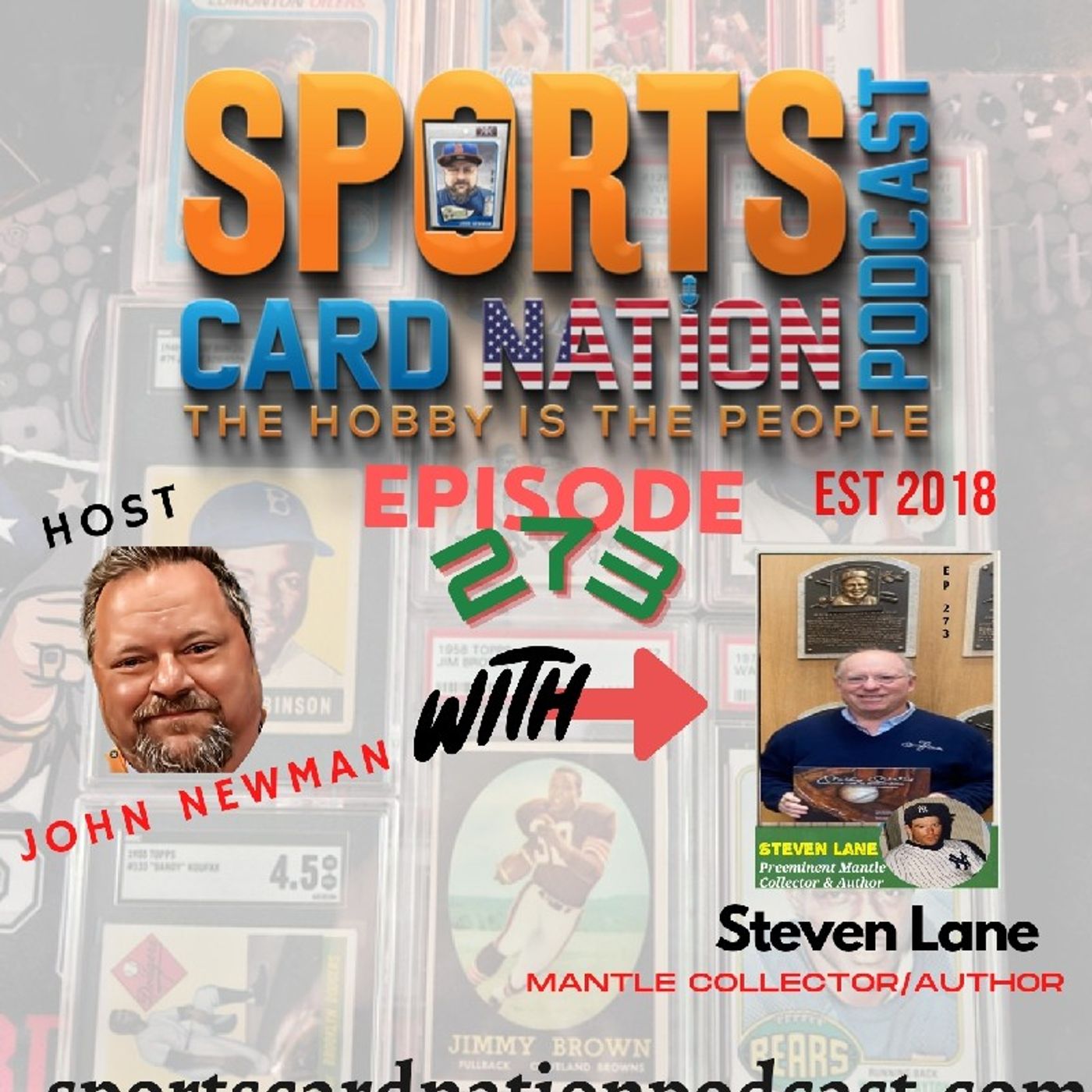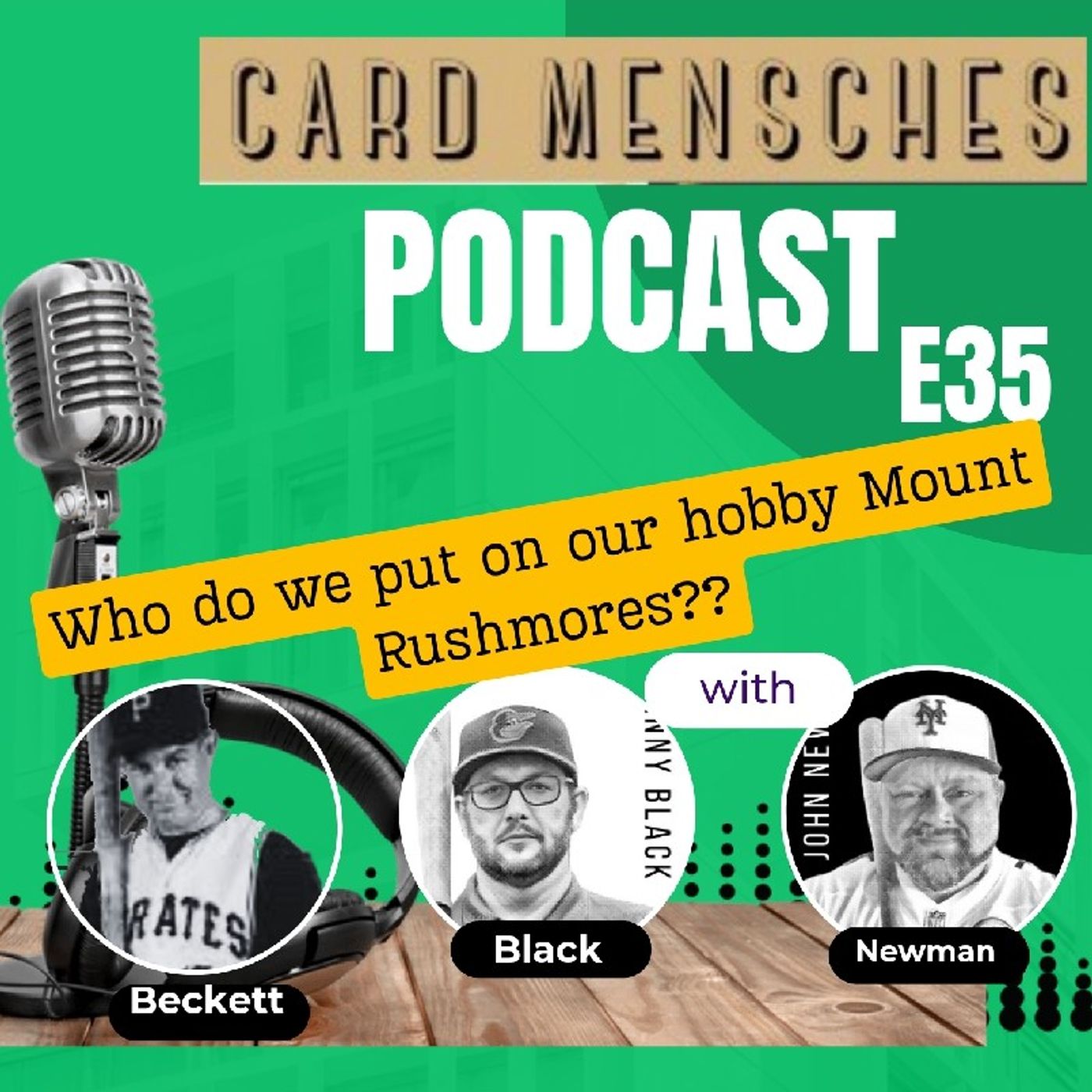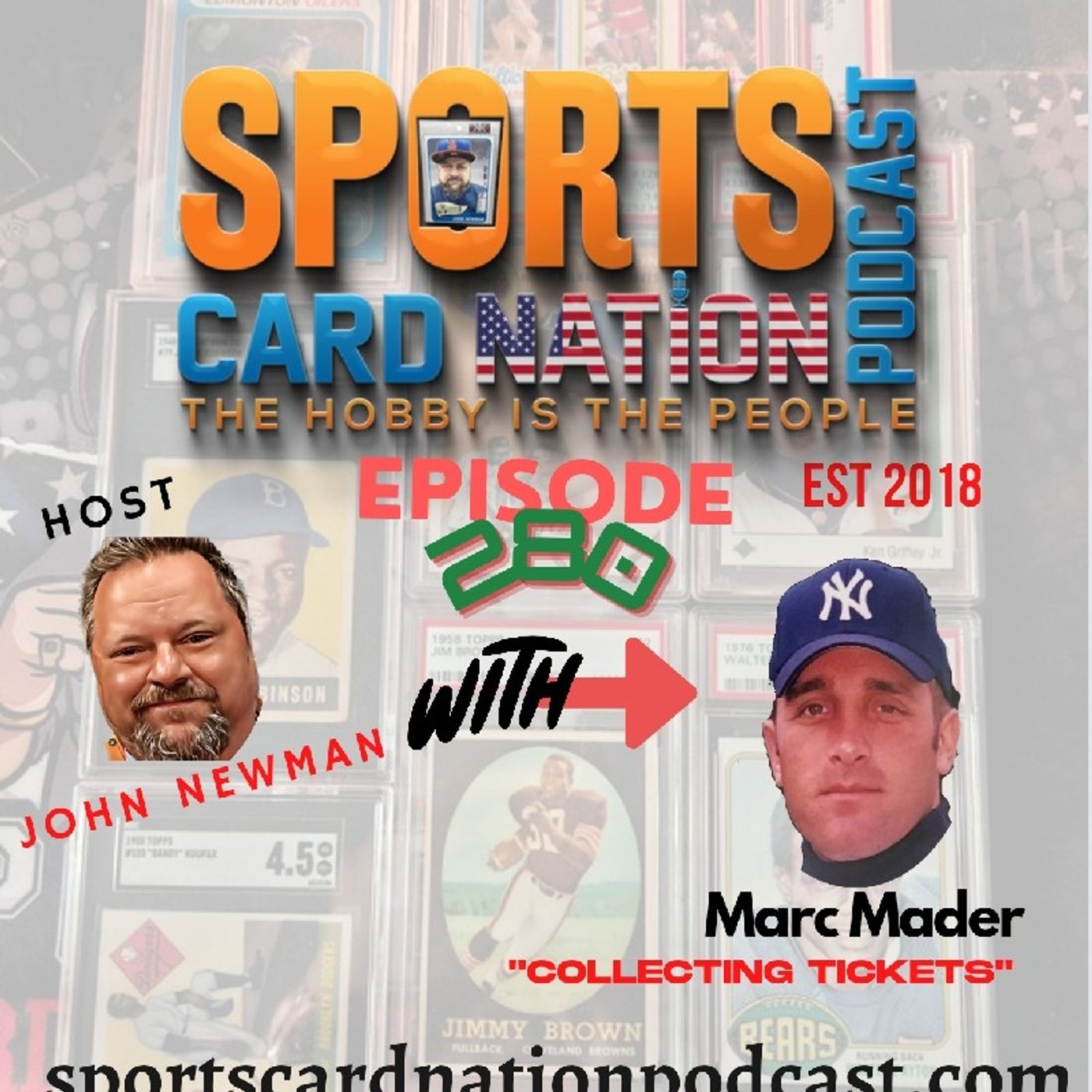Ep.244 w/ Tracy Hackler "Returning to his roots"
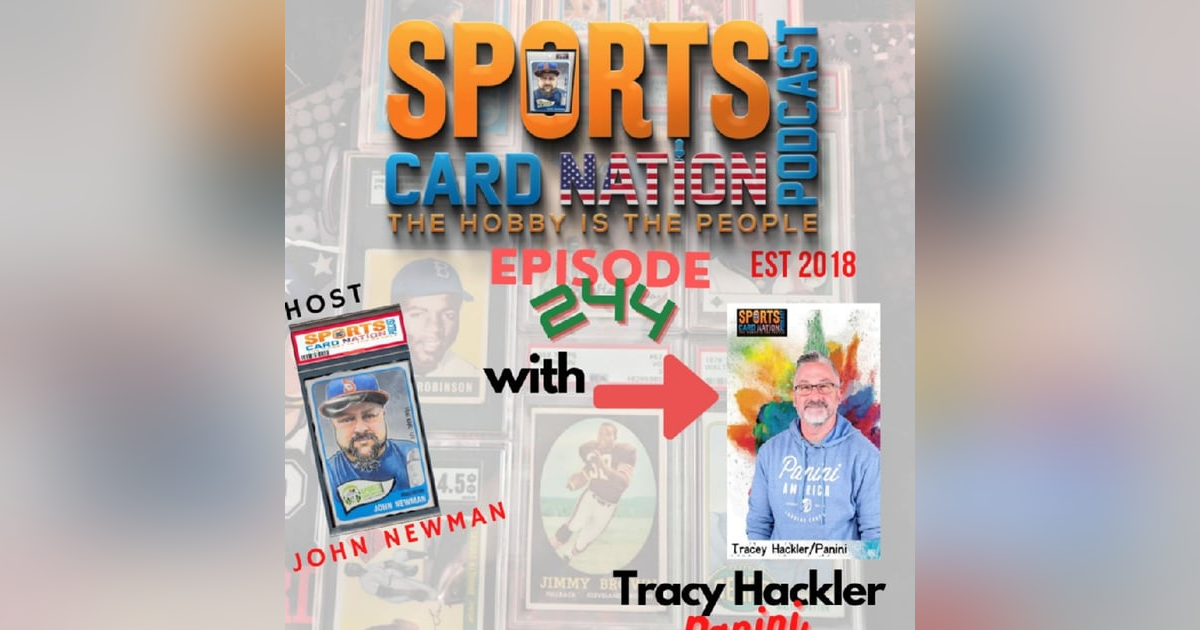
Not too many people have the hobby resumé or experience that Tracy Hackler does, to last that long you have to love the hobby and Tracy does, he joins us to share that passion and talk about his return to Panini.
Follow us on Social Media:
Website:
https://www.sportscardnationpo...
https://linktr.ee/Sportscardna...
Become a supporter of this podcast:
https://www.spreaker.com/podcast/sports-card-nation-podcast--4761791/support
.
SPEAKER 1: Here's a gentleman who's a fierce advocate and ambassador for this great hobby.
SPEAKER 1: He has his finger on the pulse of the hobby.
SPEAKER 1: However, his voice is nowhere as smooth as mine.
SPEAKER 1: But he does try.
SPEAKER 1: Here is John Newman.
SPEAKER 2: What is up? Episode 2 44 Sports Card Nation?
SPEAKER 2: Got a great guest today. Tracy Hackler from Panini.
SPEAKER 2: I've, I've known him a little bit finally, can get him on a busy guy. But between, you know, working for Roadshow and then coming back to Panini, he's one of the good guys of the hobby. Ii, I firmly believe that. Know it.
SPEAKER 2: And, you know, I like again, I like to highlight, those folks as, as much as I can. So, he's our guest today. Disclosure in advance of this interview.
SPEAKER 2: I know there's some ongoing stuff, with pin lawsuits and, and other things.
SPEAKER 2: He'd love to talk about them, but he can't, by law, he just can't comment on those things till they're resolved. So, you know, I, I love feedback. I love hearing what you think, but just in advance advance notice, that's why he can't touch on those subjects. He's not ducking questions.
SPEAKER 2: He just by legalities, can't, can't comment on them. So, just keep that in mind. But, we tackled some other stuff, as well. So, without further ado, let's get this episode underway.
SPEAKER 3: Time for our hobby is the people announcer of the week.
SPEAKER 3: Yeah. This is the card carver. Remember the hobby is the people, if you'd like to be the hobby is the people announcer of the week. Do a wave or MP3 file and send it to sports card nation PC at gmail dot com.
SPEAKER 4: Are you a new sports cards collector or someone returning to the hobby? Maybe you're just looking for a friendly trustworthy hobby community to hang out with and enjoy collecting Midwest Box brands has been bringing collectors together for many years with affordable brakes, helpful threads and a Discord group packed with generous people who genuinely care about the hobby and other collectors.
SPEAKER 4: Check out the brakes at Midwest Box breaks dot com. Our goal is to bring you as much value as possible. Also find us on Twitter At Midwest Box.
SPEAKER 2: Also remember to check out Midwest Box brakes marketplace for brakes packs and single cards from over 300 trusted sellers apply to sell today at ISO dot gg forward slash Midwest Box brakes.
SPEAKER 5: Iron sports cards is your number one source for all your PS A and other grading submissions. Their elite status improves turnaround times. Heck, they even provide the card savers. Their chat rooms provide updates on all your submissions.
SPEAKER 5: They also offer wax options and single cards to cover all the bases. Check them out on Facebook at Iron Sports Cards Group or on the web at Iron sports cards dot com or even give them a call at 1 877. Ironp A Rob's got you covered.
SPEAKER 2: Real excited to have the next gentleman on the sports card shop guest signed for his somehow is only his first time. But, better late than, than never as they say. Now back at Panini, Mr Tracy Hackler.
SPEAKER 6: Welcome John, thanks for having me on, man. I'm excited that that intro got, got me pumped and made me, so like I've missed out by not being on this, on your show before. So I'm excited to be here.
SPEAKER 2: Well, it's sort of new. So if you would have been on it, like in the back of the day, you wouldn't have got to, you wouldn't have got to see it. Ii, I, I'll say that much but I, I appreciate you making some time. I know you're very busy.
SPEAKER 2: Kind of go back, you know, you've been in a hobby a long time, wore, wore many hats.
SPEAKER 2: I, I can make an argument. You're probably one of the most experienced guys, in this hobby, that we all love. You know, you, you, you left Panini, a few years back to, to join gimmies. You know, Mayhan in the Roadshow. Obviously, that's the reason enough Jimmy as you can attest he was a great guy, smart, compassionate.
SPEAKER 2: How tough of a decision, you know, you were at Panini while when, when you, you made that decision to leave at that time. How tough of a decision was it? At that time.
SPEAKER 6: It was really difficult, probably the, the toughest professional decision I ever I ever made.
SPEAKER 6: And, you know, because I love Panini, I'd been there for 11 years, had been sharing an office with one of my best friends doing really fun and effective productive work for Panini and for the trading card industry, large as a result. And, I could have, I tell everybody I could have done it for 11 more years and 11 more years after that.
SPEAKER 6: But Jimmy, like you said, he's, he's a really unique dude and I, I had the chance to get to know him a little bit through the industry prior to two years ago. And when he talks, you listened and I, listened and I loved, I loved him really more than anything else. I loved his vision for the Roadshow, franchise, loved his shop in Kentucky and loved what he stands for as a first and foremost as a human being.
SPEAKER 6: And then, and then as a, as a hobby, advocate. So to speak. And so so, although it was a lot of, long, long nights of, of contemplating and thinking and talking to my family and my friends and it turned out to be a pretty easy decision. I mean, it was so I wanted to do, I felt really, right about making the move and quite frankly, had, had planned to be there for a lot longer than I was.
SPEAKER 6: I think we did a bunch of really good things in a short amount of time to put Roadshow on the map. And I'm proud of the work we did there. But more importantly, I'm proud of, of the relationships I developed there. And Jimmy, first and foremost is just the, you know, the fellow Christian man and his heart is bigger than the whole state of Kentucky.
SPEAKER 6: And so love him and, and, and dubs and all the other guys. I got to work. I mean, I could list them all. In fact, Tray Cody Kevin, the channels brothers, Jimmy Gale Will Barton, I mean, Brian Fillmore, Jimbo, I mean, the, the list goes on. It was a small company. So I got to really know everyone there and feel like they're family.
SPEAKER 6: And but when the opportunity, this newest opportunity with Panini came up, II I listened, I, I've always said, listen to every opportunity that comes your way because you just never know. Not that you're unhappy or disenchanted with where you're at, but you owe it to yourself and your family and people you love to, to listen when opportunities arise.
SPEAKER 6: And, and this opportunity with Panini came through, a dear friend of mine for many decades, Jim Stefano and he said we have a need for you and product development. Would you come do it? And I gave it some thought and that was another really tough decision for me. But, I came back and left a company that felt more like family than it did a profession and re-entered a company that absolutely feels like a family. So I'm excited.
SPEAKER 2: Who knows for, for naming all those folks at, at Roadshow, you got a better memory.
SPEAKER 2: I would have trouble doing that but that, I think that's a testament to you and, and your professionalism and, and your, you know, how you care about people.
SPEAKER 2: You know, coming back and here's the other thing I, those friendships still exist. So what, you know, whatever, whatever hat you're wearing, the, those relationships that don't go by the wayside, it just might be in a different form. What was that like? You know, you, you're, you, you're on the corporate side at a car manufacturer.
SPEAKER 2: You, you know, as a working at Panini, you, you deal with L CS S and, and, and obviously a very important part, kind of the, you know, one of the life blood of, of existing and then you're part of one or part of a chain. What was that like? Going from 11 aspect to the other, speak to that.
SPEAKER 6: It was really, really different.
SPEAKER 6: You know, the first thing you realize when you go to work for a small startup is the, the marketing budget isn't quite what it was when, when you're at, you know, so you gotta be a little bit more creative, a little bit more.
SPEAKER 2: I, I will say this not to cut you up. The, the set up you had at last year's National was, was probably, I don't know about budgets, but it was one of the best ones, best ones there. I, I mean, with the, with the, the, I don't know, the steel rig and I thought I was at a, a wrestling arena but a very cool, but I didn't mean to cut you off. But I was, no, no, that was just that.
SPEAKER 6: No, that's one of the things that Jimmy told me early on, right when I started, he gave me kind of a short list of things that were, that were really important to him. Having a booth in the corporate area at the National was very important to him. And I, you know, I've been on the, on the Panini side and the side of shows for many, many years.
SPEAKER 6: And so I knew how difficult that was going to be to pull off. And I think it's a testament to, to a lot of key relationships I've developed over the years of people that are friends and not just work colleagues but their friends.
SPEAKER 6: And, I kind of leaned into some of those to, to be heard and try to get Roadshow, a spot on the, in the corporate area and then leaned into some friends I made here at Ni Kusi Schuster is the guy who kind of built the booth that Jimmy had envisioned. And, again, it's all really everything that I accomplished at Roadshow is a result of relationships I'd fostered and developed and nurtured over the years.
SPEAKER 6: And I think that's how I've tried to live my life, not just my career professionally, but just in everyday life is just build meaningful relationships that you can, you can lean on and they can lean on you for, for forever, no matter what field you're in, what place you work at. It's more about the relationship.
SPEAKER 2: And now, you know, coming back to Panini from that side, it kind of gives you, in my opinion anyway, a unique perspective, right? Because now, you know, when you, when you in your first for a at Perini, right? You probably have, I was a former store owner, people complaining whether it be about Alec Ka, who, you know, people complain.
SPEAKER 2: I think that's the, the more of the story but now you get sort of a perspective from that side. Do you think that experience, you're, you're very experienced in general? But you think that experience at the L CS level is something that in your return here to Panini can actually aid you in, in, in what you do there again.
SPEAKER 6: Yeah, absolutely. I mean, I think it's huge. I think that, that the L CS side of it is one side. I hadn't worked in, I worked on the manufacturer side, on the, on the publication side and I'd never worked on the L CS side. And so, you kind of know or you think, you know what goes on at an, at an L CS, but you don't really know it and feel it and sense it until you're at an L CS.
SPEAKER 6: And you hear people talk about allocations, you hear people complain about margins and WW when you're in, when you're running a business that relies solely on allocation and margins or not solely but largely on allocation of margins. Feel the paint now.
SPEAKER 6: And, and it, it, it is an eyeopening perspective to have and it's kind of the same emotion or the, since I had, when I was at Beckett early in my career and worked there for five years and then went to, and then I, that gave me a whole new appreciation for what card manufacturers go through and how really every single product that gets out the door is a minor miracle knowing how many steps and hurdles and levels of, of approvals are involved.
SPEAKER 6: It, it gives you a, a keen appreciation for what folks in that side on the manufacturer side, on the LCL CS side go through. And, I think there'd probably be a similar understanding for people who are on the outside who would come to work for a manufacturer and see that. Oh, ok. It's, it's not that easy always.
SPEAKER 6: Or there are all these other, preventative measures sometimes that keep you from doing. Maybe something that somebody on the outside thinks is a no-brainer. Why don't you do this card or why don't you do this? It's like, well, we, we can't really do that. The leagues won't let us, we can't get that approved or whatever the reason is.
SPEAKER 6: But, I think it would be in a pipe dream kind of scenario, having a class where kind of like a, a real, a graduate level class for all the hobbyists to spend time at a manufacturer, spend time at an L CS, spend time at, with the leagues and to give more of a, a universal understanding of everything that goes on to make the industry click every day.
SPEAKER 2: Well, I think you just came up with an idea to do a, a master class, and now that you wore those hats, right, who better, who better, to do it. And now listen, if anyone complains on from a store level to you, you can actually say, hey, I know how you feel. And, you know, before, if you said that they'd say no, you don't, you know, now you can say yes, I, yes I do.
SPEAKER 2: And they can't, they, they can't argue with that. But you know, what do you think, you know, wearing kind of the, the L CS hat where being in man, with a manufacturer? What do you think is the, you know, one of the bigger things you have to deal with kind of for on both side?
SPEAKER 6: I think really, I mean, the the thing that impacts all sides is that just the current market conditions and how quickly they could change. And I think if you, because I've been, I've been in the industry, I've been blessed to be in this industry for 28 years.
SPEAKER 6: You've seen the roller coaster ride and it's the last four or five years have been incredibly unprecedented in the best possible ways, but we've also, I've also seen it when it's really low. You've seen it John when it's really low and it's not all we know, it's not always up so high. And so I think the market conditions and understanding that, that they can shift without warning on a day's notice or a week's notice.
SPEAKER 6: I think just trying to be as prepared as possible before the market shifts for the market shift. And that's, I think when things are going crazy, sky, sky high values and, and the doubling or tripling or quadrupling your money every day, some people lose site of the fact that it's not always going to be like this.
SPEAKER 6: Nor is it supposed to be like that if it was the, we wouldn't be around long. So I think, but that's one thing, the market conditions impacts everything.
SPEAKER 6: The manufacturer side, the, the L CS side, the leagues side, I mean, and so I think knowing those who don't learn from history are doomed to repeat it. Right. And know what they say.
SPEAKER 6: And so I think, just knowing that it's not always so many new people came in when the thing was skyrocketing during the pandemic and, and after, and I think a, a lot of those people may have lacked some perspective on where we, where we've been before and where we can go again if we're not careful.
SPEAKER 6: So I, I think just doing everything we can, all of us in, in our own ways and our own silos, and then collectively to prepare for those market shifts up or down. Yeah.
SPEAKER 2: And, great, great commentary there. It's true. I've been, you know, in the hobby since 1979 there's been peaks and valleys all through the years and, and I don't think anybody, I don't care when you, who got the hobby or how long really saw what was gonna happen during the pandemic and anyone that, that says that is probably not being you know, genuine.
SPEAKER 2: I, I was shocked, I think a lot of people were shocked but during that even on this very show, Tracy, I, I was, you know, it's great. Enjoy it. There's nothing, you know, you didn't, no one's doing anything wrong as long as you do everything above board in the right way.
SPEAKER 2: But, you know, this isn't gonna, like you said, this isn't going to be the case forever. Like this is, you know, it's going to calm down to what level remains to be seen and even that's not a bad thing. Right? Because there's now cards at the crescendo phase, right? That I couldn't obtain, I'm sure others the same boat. Right.
SPEAKER 2: And now we've seen sort of a, a settling down where some of that stuff now back in, in the budget. So there's, there's positives and negatives to, to every scenario. It's what you really, like. You kind of said, what you choose to, to see and kind of, focus on. So, you know, but then, you know, I'm sure you hear it too that the hobby is, is gonna die or, you know?
SPEAKER 2: No, it's just gonna be different levels to it. The hobby's been around for over 100 years almost and it, it's gonna be here when, you know, and hopefully later than sooner when, when we're not. And, still going.
SPEAKER 2: And so, and whenever I hear that I always kind of chuck on just, you know, it's, it's the, you know, the doomsday, the sky is falling kind of folks that like to, you know, whether you want to call it click bait or attention.
SPEAKER 2: But, you know, the hobby settled down but it's still thriving. There's still tons of transactions. We still see new businesses forming new stores popping. Ii, I venture to say, and I'll get your opinion on this. You know, we, I had a store from 1992 to 97.
SPEAKER 2: I think I've never seen as many stores, in my opinion. I don't, you know, I don't have a number but it seems like we have more stores now than, than ever. Before wo, would you agree with that?
SPEAKER 6: Yeah, I think maybe back in the, I don't know, late eighties, early nineties there, there may have been more hobby shops. But I, but you, but your point is a good one and, and that the number of new hobby shops over the last five years is that type of growth, probably rivals.
SPEAKER 6: What happened in, in that, that real big boom of the early nineties when, when everybody was jumping in from, an L CS perspective, a manufacturer perspective. And, I think, but I think it, it's, it's, I think the shops today are, it's so different. And maybe the reason that the numbers haven't, might not be as big as they were is because online sales are such a big thing now and, and they weren't back then.
SPEAKER 6: But I think the, the hobby shop, in my opinion, has always been the place to go. It's, you, you mentioned the word and I've used this word to the lifeblood of the, of the industry.
SPEAKER 6: That's where I learned about cards and where my card dealer, Ken Green at Pun And Dunk Sports Guards in Louisville taught me things about players and about how to collect and what to collect. And I think that that still goes on in, in the best shops. They're inviting welcoming places for people to come and hang out, just soak stuff up.
SPEAKER 6: And that's one of the things I love about the Road Show model was that it all four of their shops are uniquely geographically different. But the, the key, the key mantra is the same is like come in and learn from us and just hang out if you don't buy anything at all. But you come and have a good time and hang out with us. Learn about cards, teach us about cards too.
SPEAKER 6: That and I see that going on in Kentucky, I see it going on in New York and California and Texas and it's just, and the best shops around the country are like that and I think they'll, and like you said the hobby is not going anywhere. I mean, if, if I could count the number of times I heard the hobby was dying over the last three decades.
SPEAKER 6: I mean, it would have had more lives than a cat. And, it's, but it's not gonna die, like you said, it's been around since the late 18 hundreds and it, it'll live beyond all of us and keep thriving. I just think market conditions are up and down just like anything else. And as long as you're prepared for that and weather, weather for that, as much as you can, I think, I think you can make this industry anything you want to.
SPEAKER 2: Yeah. Yeah, no doubt.
SPEAKER 2: You, you touched on, you know what the road shows, for stores we've, we've seen other stores kind of start to franchise even, you know, along the same lines. It's difficult, you know, to operate any business as a former L CS owner.
SPEAKER 2: You, it's not as simple as just turning the sign to open and, and, you know, people are just gonna walk in and naturally you gotta put in some work and effort. You got to be smart and, and strategic. It's hard to operate one store. Talk about the degree of difficulty to franchise a, a store, especially when it's multistate.
SPEAKER 2: It's one thing to be, in the same state, maybe in different cities. But now you're, you're going, all across the the nation, you know, coast to coast, talk about not the difficulty, you know, obviously the degree of difficulty is gonna go up, when, when you do that.
SPEAKER 6: Yeah, absolutely.
SPEAKER 6: I mean, that's one of the things that attracted me to, to the road show initially, aside from Jim and the, and the other great people, there was the fact that it was a true kind of coast to coast franchise shop and, and each of the shops is different, but it's all Roadshow, there's Kentucky Roadshow, Texas Roadshow, New York Road, California Roadshow, which just opened a few weeks ago and to, to speak to your level of degree of difficulty in running a model like this.
SPEAKER 6: California was supposed to open last July.
SPEAKER 6: But permit snags in California, construction came to a complete halt in the shop. And so it was about a year, a year, late, almost a year later than it should, should have been. And that's another year where you're not making revenue in that store.
SPEAKER 6: And so you've gotta have, you gotta have pretty thick skin and you gotta have a, an appetite for some uneasy days and months when things don't go the way, You thought they were going to and I think Jimmy is perfect for that. He's very calm.
SPEAKER 6: One of the things he used to say was panic slowly because see it, we had a bunch of young, younger folks who run the shops in, in Texas, New York and California and they would, they're just ready to go. And man, we, we gotta be able, we gotta be open, we, we gotta sell this all that. And Jimmy and older guys like me and the company would say just, it's all good, just relax.
SPEAKER 6: So he would always say panic slowly, but I think you can't have eyes in all four places, right? So Jimmy has to kind of deputize or trust his, the people. He's hired to run the shops, whether it's Cody and Chase and Austin and Texas and, and Kevin and Lewis in New York or Ryan and Justin and Mike in, in California.
SPEAKER 6: Yes, Jimmy and David Diamondstein will come down and help start up each shop. The, the two weeks prior, the two weeks after Jimmy and David are on site in the locations, watching things helping things run smoothly.
SPEAKER 6: But then when they leave and go back to Lexington, the the shop managers are on their own like let's go and, and like you said, it's, it's not just build it and they will come when you turn the lights on and say on, people don't just automatically come in. There's a lot of education that goes on in your communities, in the neighborhoods.
SPEAKER 6: And you have to be patient because there could be days that you see three people and there could be days that you see 30 people.
SPEAKER 6: So I think that's another challenge is just the, the inconsistency with the startup of getting foot traffic consistently and acquiring qualified customers because, you get people in the shop and they may not always buy and that's ok, but you would just as long as they keep coming back and word of mouth is huge. And it's a lot of challenges.
SPEAKER 6: But I think all the shop guys will tell you once in any shop around the country will tell you that once you open up and you're able to kind of start see seeing your vision materialized when moms and dads and daughters and sons are coming in the shop and they're spending time talking to you or digging through your bargain boxes or looking through your singles.
SPEAKER 6: Man, it really, it makes all the difference in the world and keeps you motivated to, to keep trying to, to take it up another level time for a quick break, but we'll be right back for more than 30 years.
SPEAKER 7: Robert Edward auctions has been the nation's premier auction house specializing in sports memorabilia and trading cards with significant experience and expertise in all major sport, non sport and Americana collectibles.
SPEAKER 7: Re a has helped clients achieve record breaking prices for their items and has done so with a reputation for integrity and transparency by actively partnering with collectors and enthusiasts throughout the entire process. Re a has created the hobby's most trusted forum for selling high quality collectibles.
SPEAKER 7: Go to Robert Edward auctions dot com. For more information on how to buy or sell in their next auction for nearly 50 years. Sports collectors digest has been the voice of the hobby.
SPEAKER 7: Bringing you comprehensive coverage of the sports collectible industry from industry news, auction results, market analysis and in depth stories about collectors and their collections. Sports collectors digest has everything you need to know about the hobby.
SPEAKER 7: Also, your leading source for listings of sports collectible dealers, card shops, card shows and the latest from the industry's top companies to check out all the latest news or to subscribe to the hobby's oldest magazine. Visit sports collectors digest dot com or call 1 808 29 55 61.
SPEAKER 3: Thanks for sticking with us. Let's return to the show.
SPEAKER 2: To someone that's maybe thinking about opening an L CS now. They haven't opened yet. Do you think it's more difficult now that things have sort of settled down or, or not necessarily?
SPEAKER 2: That's a good.
SPEAKER 6: Question because I think, I think if you, if you started a shop in the height of the craziness and you don't have, you're not committed to it long term. It could not be a, you might not have the patience to, to do it, do it the right way. If you're expecting, double, triple, quadruple your returns in year one, it's probably not gonna happen.
SPEAKER 6: Unless you're just in a crazy area or you, lightning strikes, you catch lightning in a bottle or something.
SPEAKER 6: But I would never discourage someone from opening a hobby shop that, that will, that will keep the, the education going. Keep the fun, the excitement of, of this great hobby we've had for forever.
SPEAKER 6: To, to, kind of, build that community in your area wherever you are. If you're contemplating opening a shop, I think I would never discourage you from following your dream, following your dream. If that's what you wanna do and to build the next generation of collectors who will build the next ones after that.
SPEAKER 2: Yeah. And I, I think we both agree. You know, CS is, like you said, I've said, it's the kind of the, one of the lifelines lifeblood of this hobby. And, you know, especially if you're in an area where there's a void of those. It's a great opportunity, to a hobby to that area. Right. So, you always get, well, any business, right?
SPEAKER 2: If you're gonna open it, you wanna know what's around, that's of similar ilk and, and that sort of thing and, and be smart about it. So, but, like you said, well, said, right? If someone's, that's their dream, if that's their passion, who are we or anybody to say not to do something, be, be intelligent and smart about it and, get it, get it done. Right. So, that's what it's about.
SPEAKER 2: You know, one of the things we've seen, unfortunately a lot of great things during the pandemic, not the pandemic itself but the, in the hobby, customer service, kind of took a, took a hit. Not just in the hobby. Just that's, that's across the board in every industry. So it's not hobby, exclusive.
SPEAKER 2: You know, recently stuff's come out, in every company has, has some words here and there. There's a, a logo man thing with, with Panini, but we've seen even other companies, I mean, what can you say to that?
SPEAKER 2: And some of this stuff happened also, you know, while you weren't there, but now you're back, like, how do you, you know what goes on behind the scenes that you can say obviously, to combat the thing to maybe, ensure, you know, that's this stuff. Don't make future headlines in that sort of thing.
SPEAKER 6: Yeah, for sure, man. I think, I think customer service in, in any company in the hobby is a, is a, I don't wanna call it a thankless job but it, but it, it seems like it is more than it's not.
SPEAKER 6: And I, I don't know, I can't speak specifically to the, to, to the, the one example you mentioned.
SPEAKER 6: But, but I do know that, I think there could be a, a misconception that customer service folks in this industry don't care or, or aren't knowledgeable or intelligent about the products of the industry. And I can just speak for the Panini side is that they have a whole team dedicated to customer service dedicated to replacements and damages and redemptions and, and and quality control and things like that.
SPEAKER 6: And they, they do a wonderful job. I think Panini is taken strides over the last year plus to, to get more bodies in there to, to take more phone calls and to address more issues.
SPEAKER 6: And I think you're probably always going to have one off situations arise because I think in so many businesses where humans are involved, you're gonna have human error sometimes. And so I think, I, I think that can happen. I think also in a, in a, in a climate where redemptions, nobody, nobody hates redemptions more than the manufacturers, I promise.
SPEAKER 6: And so yeah, and.
SPEAKER 2: I wanna, I wanna stop you there and, and I, I agree with that and I think people forget that you guys would rather have all those cards in possession and, and distribute them into the product and not have to worry about a redemption.
SPEAKER 2: But, you know, I, I always tell people, Tracy, like if you eliminated redemptions completely, you would, you know, collectors would, would lose the opportunity to get certain athletes autographs in their packs or at least redeemed. And so that's the tradeoff if you wanna wanna make it potentially, hey, you don't want redemptions you're not gonna have.
SPEAKER 2: So and so's Autograph be in that, that product and I think that's a lose, lose, not only for the collector but for the company in, in this case, Panini because you want, you want that to someone to potentially pull that and get that card and, you know, we got to put some of the owners too on these athletes and, and getting these back in, in, in timely fashion.
SPEAKER 2: There's a lot of gears. I, I guess what I'm saying, there's a lot of gears at work. It's not one gear, it's a bunch of trying to work together. And so believe me, I get the redemption frustration. I think we, we all do it and, and, but, you know, that's the tradeoff that sometimes comes, comes up with it.
SPEAKER 2: I think some of the other complaints I hear too are like, hey, I, I waited so long and then I got offered a kind of a, a substitute but that wasn't, it didn't match, you know, it doesn't match up that, that quality of athlete or that level of athlete to, to what I was offered, you know, you know, what do you say to, to, to that complaint?
SPEAKER 6: I think, I think the whole redemption system isn't imp is imperfect. I think we can all agree with that, that it, that, that it's no matter what company you're working with or you're trying to get redeemed through.
SPEAKER 6: It's an imperfect system for, for, for what was a, a clunky kind of unwieldy issue of not having the autographs back when, when the product packed out and shipped.
SPEAKER 6: And I think, but in my, my experience with the customer service folks that I know at Panini, they're, they're very personable and so I think if you, they're willing to work with collectors, more times than not in terms of just finding out who they collect what teams they like.
SPEAKER 6: So that because they trust me, they want to please customers. They don't wanna alienate them. If we, if we were in the business of alienating customers, we wouldn't be around for long.
SPEAKER 6: And so I think there, there is potentially on the outside looking in a, a mis, a misconception, a misperception that they're just robots who don't care sometimes. And that's not it at all.
SPEAKER 6: I mean, I, I know Emily and Alex and, and Chase and those people in customer service, I know them pretty well and, and I appreciate, their, their professionalism and their willingness to, to learn what collectors want so that if the card they want is not available and they're willing to trade out the who other options.
SPEAKER 6: Here's some teams. So I think it's, I think it's, I think they sometimes will get a bad rap because it's one quick call. And I think another thing to understand here is they have, so many people they're trying to please on a, on a daily basis that sometimes things could get lost in the mix or, an email doesn't get received.
SPEAKER 6: But I would just say they're human and their, and their willingness to work with customers is, is impressive as far as I've seen.
SPEAKER 2: Ok. Yeah. No, no doubt. And again, you know, people are human mistakes will, will occur.
SPEAKER 2: The nil has, has kind of changed the landscape, not of, only of, of college sports but, but, how hobby, as well, you guys just signed, Trey Johnson, you know, to, to, a contract, high school, very revered high school basketball player.
SPEAKER 2: We've seen it change, like I said, not only the college landscape but the, the card, the hobby landscape, you know, talk about your thoughts on, on, you know, you've been in a hobby a long time. So this is something we haven't seen, on this level. This is new for everybody. I don't care how long you've been in it. Talk about like navigating that and, you know, do you like it, you know, and do you think it's good.
SPEAKER 6: All those good questions, John. So, so navigating it can, is, can be unwieldy because it's, it's so new for everyone and it's kind of the Wild West. Right? And in many cases when you're trying to reach some of these kids.
SPEAKER 6: But I think what, I think as a, as a manufacturer, we need to be responsive and, and, and not just reactive but proactive and how we handle it. Because it's here, it's here to stay. And we need to be, we need to be a, a leader in the nil space just as we are in the NBA and NFL space.
SPEAKER 6: And so I think you'll see us being pretty aggressive as you just mentioned, Trey Johnson, but a lot of other on the college front, not just I think Trey was our first high school kid that we signed, but but college, the college and a space is a game changer and yeah, I think you'll see, not just Panini but all the other manufacturers kind of diving head first into the space too and just trying to figure it out as we go because there's still so much uncertainty and so much newness around the N A machine.
SPEAKER 6: And so I think we're just learning it but also being a strategic and intelligent with how we participate. So you'll see us remain in that pool, swimming with with everyone else.
SPEAKER 2: Yeah, like you said, it's, it's here to stay. So you, you, you, you have to kind of adapt and, and thrive and survive and, and, and that sort of thing. Speaking of that, you know, the hobby landscape, you know, I'm old enough to remember where, you know, a week's worth of hobby news today would happen in a year. Back in the day the hobby changes quick.
SPEAKER 2: The landscape is obviously changing. It's gonna change, for you guys here in the next couple of years. How do you, you know, how do you navigate that? Talk about, like, the, the process, the difficulties, you know, obviously Panini is gonna try to stay around and I hope they do. You don't want to see anybody not succeed.
SPEAKER 2: You know, but talk about the landscape and navigating that as it as it's changing here.
SPEAKER 6: Yeah, man, I can say that coming back to being, I missed a lot of a lot of the the excitement around, around the this new future that's coming. And so diving back in, I can tell you that the, the attitudes here in the, the desire to, to create valuable compelling products every time out is still very strong here.
SPEAKER 6: I don't think, I don't think any of us is looking too, too far down the road. I think we're looking at, at building every product the best that we can to make it to make sure that it lives up to what collectors expect for from those products. And I think, yeah, I think the future is bright.
SPEAKER 6: I think we're the nobody's walking around here, not excited, everybody's excited. Everybody's comes in every day, looking to, to win, win the day. And I think that that was true five years ago and it's just as true now.
SPEAKER 6: And so, I think that can only lead to good things, but both in the short term and in the long term and exactly what the landscape will look like then who knows? But I think that our attitudes will be the same no matter what it looks like and we're gonna still be here doing what we do best, which is make trading cards for, for the people, man.
SPEAKER 2: Going back kind of backtracking slightly with the, with the nil. Do you think that's, that's gonna be a big part of, of, of that future as well?
SPEAKER 6: Yeah, I think so for sure. I, I think nil will be, I mean, it has to make sense, right? Like I don't think we'll just dive into the a nil space just to be in it. I think it's still like everything else. We, we do, it needs to make business sense for, for us to, to engage in those types of relationships.
SPEAKER 6: And I think we have, we have a few big ones coming up that we're gonna announce that I, I think people will see they make real sense and I think there's a a strong desire to keep finding those deals. Across all sports. So, so I think it'll be a big part of what we do going forward.
SPEAKER 2: This May Air Tracy, like the National might be in the books and, and done in Chicago. But, your, your thoughts on the, on the, you know, we're recording this before the National, your thoughts, on the coming National, back with Panini, kind of what we might expect to see, at, at your, at your guys' booth. And, some of the things you, you, you, you've been to enough of them now, I'll call you a National expert.
SPEAKER 2: You know, and, and now coming back kind of to the, the Panini side, some things, we should expect seeing things you, you enjoy at, at the National.
SPEAKER 6: Yeah, the National is one of my favorite weeks on the calendar every year just because I first fell in love with the National. Not because it was this massive trading card show where things you didn't even know existed showed up every year every summer.
SPEAKER 6: That blew my mind. Going to my first National back in. What was it? A Arlington, Texas 80 85 86 I think.
SPEAKER 6: But then going to my first one as a, as a professional in the, in the industry was 96. And, I've been to probably all of them since. And my favorite thing to do is to talk to people to to collectors and people I work with in the business colleagues who I get to talk to on the phone all the time, but never get to put a, never get to see their face.
SPEAKER 6: I love talking to those people every year. And so some I've known for 28 years and some I, I just met last week or whatever, but I, I love hearing stories. I love to, to hear what Panini can do better, what I can do better.
SPEAKER 6: What you collect, how long you've been collecting, why you started collecting? Like what collecting means to you. I've, I've stood in booth from the, the Beckett booth to the booth, to the Panini booth, to the Roadshow booth and now the Panini booth again.
SPEAKER 6: And I'll stand there all day and I just love talking to people and hearing their stories and, and you really, it, it helps me every year to, to, to hear the stories of why collecting is so important to people and it's not just money, it's never just money. Like so, yeah, the big money cards get all the attention in National headlines and that's what Drake was and, and, and what King Golden wants and what everybody promotes.
SPEAKER 6: But man, it's so much more than that. It's, it's it's the, the dude who I sent a box to 10 years ago because he lost his job and he sees me every year and he cries and he, and he hugs me again because I sent him a box of, I think it was like black football or something.
SPEAKER 6: Those types of stories and, kids who collected with their dads and their moms and how they still collect, even though mom and dad have passed in, they still love it and do it in their honor of their, of their parents and brothers and sisters and how it helped people get through tough times.
SPEAKER 6: And that's what trading cards are to me. And that's why I love the hobby so much and why I love being in the business because it's, you do realize it's, yeah, there's a lot of crappy stuff that goes on from redemptions to product delays to product cancellations to, I didn't get the hits out of my box I wanted.
SPEAKER 6: But, and that, that stuff matters, don't get me wrong. But the, the thing that matters more to me is just the, the, the people side of the business and what it means to people.
SPEAKER 6: And that lifts me up every year and, and I can, I look forward to doing it again this year.
SPEAKER 2: Yeah. Well, said, and, you a great point. Right. We, everyone wants their cards to be worth as much as they can. But that can't really be the only reason you do it. I think if it is there, you know, in my opinion, it's maybe not not the right way to go about it but, you know, enjoy what, you know, they always say, you know, collect what, where the, the value went to zero.
SPEAKER 2: You would still enjoy having that, item in your possession. I think that's the, the, the best way, to collect and, and hearing those stories that, like you said, it makes what you do, you know, fulfilling, and, easier to go to work each and every day to, to get that stuff. Done.
SPEAKER 2: Ii I know you're busy, Tracy, I appreciate you. You making some time for, for us and the listeners as always, I give the guest kind of the, the final word, give out any of the socials. Where can people could, whether, whether it's fine, you or the company, anything you want to share with, with those out there that well, if you wanna.
SPEAKER 6: Find Panini America, it's pretty easy. Just Panini America on Instagram, Twitter, Facebook, YouTube, all that if you want to find me, which I can't imagine why you would. But it's Tracy underscore Hackler on Instagram and Tracy Hackler on Twitter.
SPEAKER 6: And I, I read, I listen, I conversate. So if you ever wanna blow me up or you have a complaint or, or whatever, I, I listen, I always listen and and I'll respond and, and yeah, hit me up anytime.
SPEAKER 2: And I can attest to that you've always responded. I've, I've talked to you in person. I've talked to you online. You know, just be careful what you wish for. There. You, your, your inbox might blow, blow up. But, listen a lot of knowledge, with, with you a lot of hobby experience and, you can't that.
SPEAKER 2: And, and, and, you know, I always say, I don't care how long you're in a hobby. I still learn, every day. I know you are too. And the minute, the minute I stop learning, I know it's, it's time to like, hang up the cards and, because I know that's never gonna happen.
SPEAKER 6: So, I agree.
SPEAKER 6: I agree. And I appreciate, I appreciate you, John. I appreciate you having me on and I appreciate what you do for the, for the hobby and for the people and, and like it says the hobby is the people. So you get that and I really believe that strongly and, will join you anytime you need me.
SPEAKER 2: Ok. Well, coming from, I, I appreciate that and every time I, I hear, but coming from, from, from you even all the more so, so continued success. I'll see you here in a, in a few weeks. And, at the, at the same thing, we both get a circle on our calendars, each and every year for probably very similar reasons. So, I, I'll see you soon travel safely.
SPEAKER 6: Brother, we'll talk to you soon.
SPEAKER 2: John having Tracy, finally on the show we recorded at probably two weeks before the National finally can get that out there.
SPEAKER 2: I know there's some lawsuit business going on. Obviously, Tracy is not able to discuss that as it's ongoing. There's a few things unfortunately he couldn't discuss because they're, they're still ongoing and that's, that, that goes with any kind of case like that.
SPEAKER 2: So you can, you can kind of complain about that, but that's how it normally goes. You know, obviously we can have him come back on when some of that settles out and I'm sure he would and would have no problem with that. So, again, appreciate him making some time, for the show. And, he's a good guy. Right. He's a good hobby guy.
SPEAKER 2: And, I, I like to highlight those kind of folks.
SPEAKER 8: Hobby news daily is your home page of the hobby providing original writing, exclusive gem rate data, a daily morning minute podcast and some of the best content creators in the hobby. Remember hobby news daily dot com. And at hobby news daily on Social Happy Collecting.
SPEAKER 9: Hi. This is Pat Hughes Cubs announcer. Coming to you from the sports card shop in beautiful New Buffalo, Michigan.
SPEAKER 9: The Gocher family has built an incredible place here for collectors to buy, sell and trade cards and memorabilia. Be sure to stop by and let them show you around the sports card shop dot com, connecting sports athletes, the hobby and collectors around the world.
SPEAKER 10: Hi, this is Alan Pinkett and I'm here to tell you, the Gocher family has done it again.
SPEAKER 10: They've just opened up the sport card shop in downtown Valparaiso, Indiana and it is awesome.
SPEAKER 10: If you're a collector, you need to check this place out. Tell them Allen sent you and get a free gift on your first visit.
SPEAKER 1: That's a wrap for this week. Huge thanks to you, the listeners out there because without you, there is no ice.
SPEAKER 1: If you like the show, we truly appreciate positive reviews.
SPEAKER 1: Big ups to our great guests who drive the show and our awesome sponsors who make it all possible.
SPEAKER 1: Sports Cod Nation will be back next week but don't forget to catch either hobby quick hits or Card Mensches coming up on Monday.
SPEAKER 1: I leave you with this.
SPEAKER 1: How do we change the world?
SPEAKER 1: One random act of kindness at a time.
SPEAKER 1: Remember the hobby is the people.








